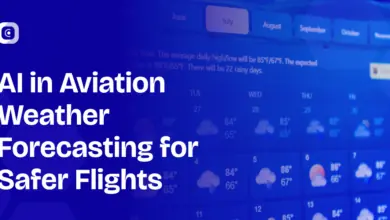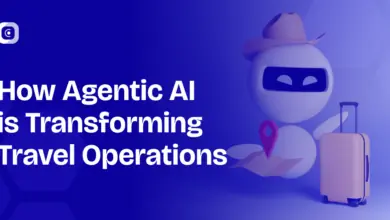How AI is Revolutionizing Flight Tracking and Real-Time Travel Updates
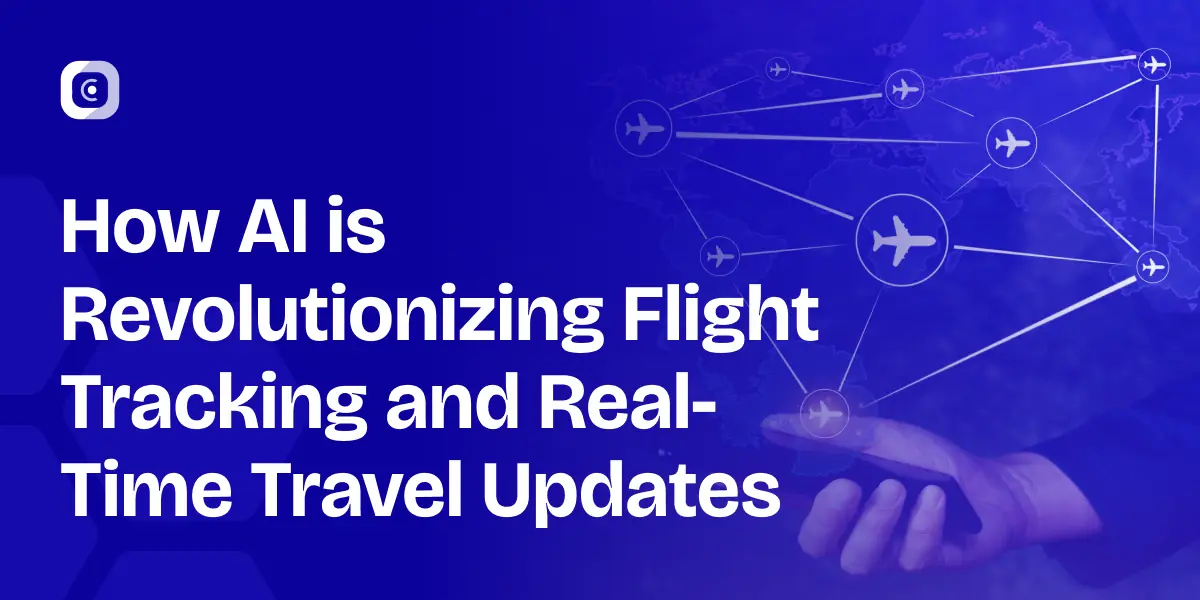
As the travel market continues to change and evolve rapidly, real-time flight tracking has become a crucial backbone for airlines, travel agencies, and travelers. From flight schedules to safety announcements, travelers demand both timely and accurate information. But old-fashioned radar and ground-based systems are struggling to keep pace with today’s more complex air traffic. That’s where Artificial Intelligence (AI) is transforming aviation.
With the use of AI in aviation, airlines can predict flight delays, automate alerts and deliver continuous real-time travel updates. But this move isn’t simply about speed, it’s also about intelligence. AI systems are always learning as they process the flight data, weather models and operational patterns to make sure travelers and operation teams stay ahead of the curve. Many of today’s systems integrated with flight booking APIs are now including AI modules for matching flight data with live traveler’s notifications. And that means customers always receive the most accurate, precisely contextual updates wherever they are.
What Real-Time Flight Tracking Means in Today’s Aviation Ecosystem
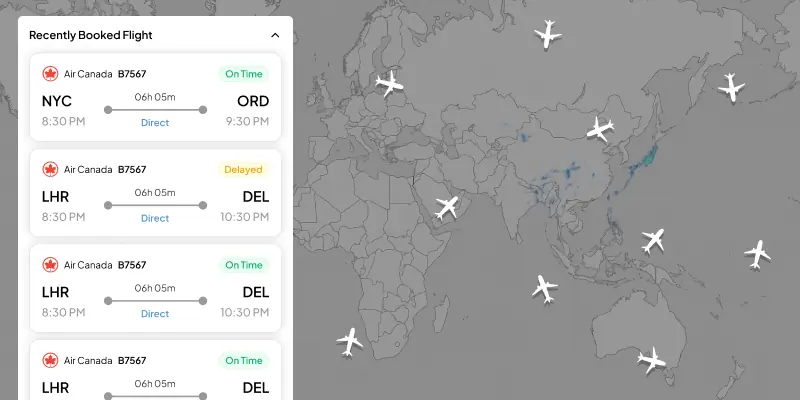
Essentially, real-time flight tracking allows for live monitoring of an aircraft from departure, through cruising altitude, and to arrival. For travelers, this means reassurance and accuracy, and for airlines, operational efficiency and data-driven decision making.
The application of AI in this ecosystem focuses on developing active predictive data insights. Within the aviation sector, AI flight tracking integrates radar, satellite feeds and machine learning algorithms to anticipate turbulence, route congestion, and other trip factors. An airline passenger might receive an AI-generated update estimating a 20-minute delay caused by headwinds even before the airline officially announces the delay. The integration of AI in travel industry, alongside the incorporation of connected systems, provides the way for advanced travel experiences, with proactive information sharing.
The Role of Artificial Intelligence in Modern Flight Tracking and Travel Updates
Integrating artificial intelligence into real-time flight tracking systems enhances intelligence and transforms raw data into insights. The volume of data processed by AI systems such as air traffic data, maintenance logs, and historical flight patterns directly influences the accuracy of predictions.
Data Integration for Real-Time Accuracy
Artificial Intelligence compiles and integrates information from numerous sources, including onboard sensors, ADS-B systems, satellite communications, and third-party aviation databases, into a unified dashboard that displays real-time data on location, estimated times, and anomaly detections. As an example, when these systems are linked with flight booking engines, the systems can reflect updated flight statuses on the booking portals instantly without the need for manual refresh.
Predictive Analysis and Delay Forecasting
AI goes beyond simply observing movement. Through analyzing variables like air pressure, weather forecasts, and airport congestion, it gives predictive flight delays using AI. This allows airlines to modify schedule adjustments, and plan alternative routes, far ahead of time.
Automation and Alerts
AI’s automation capabilities eliminate the lag between data updates and passenger communication. Using AI-powered airline alert systems, airlines can inform passengers of any last-minute gate changes or cancellations in real-time. The combination of AI in aviation and automation ensures seamless alignment across multiple airports, bookings systems, and travelers to deliver genuine operational intelligence.
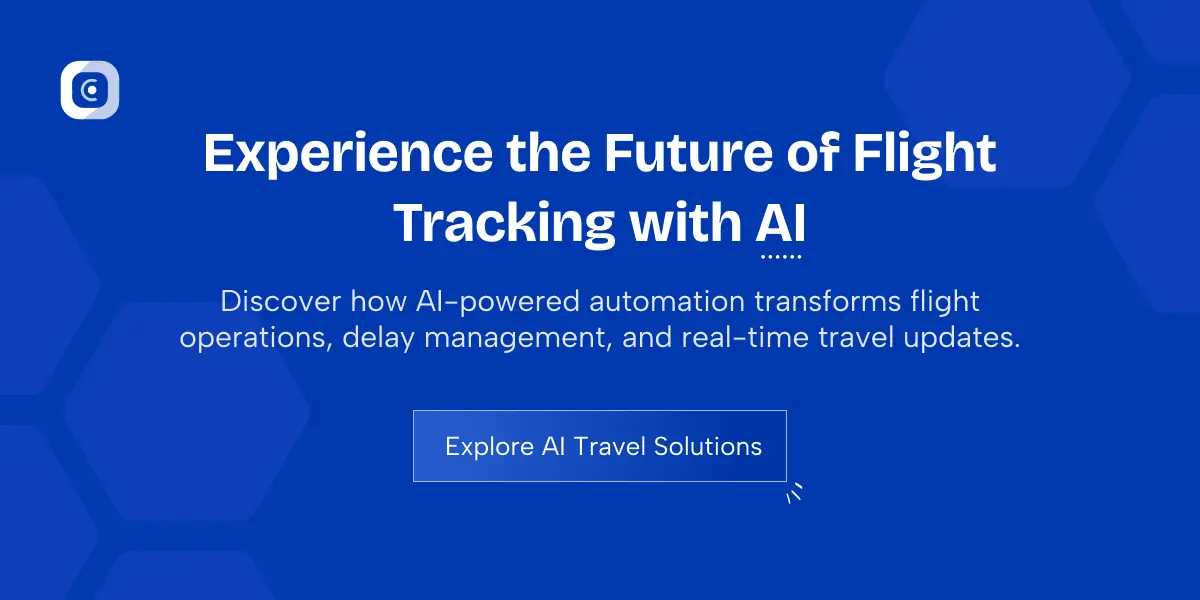
Key Features of AI-Powered Real-Time Flight Tracking Systems
AI-enhanced flight tracking systems have moved beyond mere visibility of an aircraft’s location to providing airlines with an operational assistant. Here are the key features which make AI flight tracking systems indispensable:
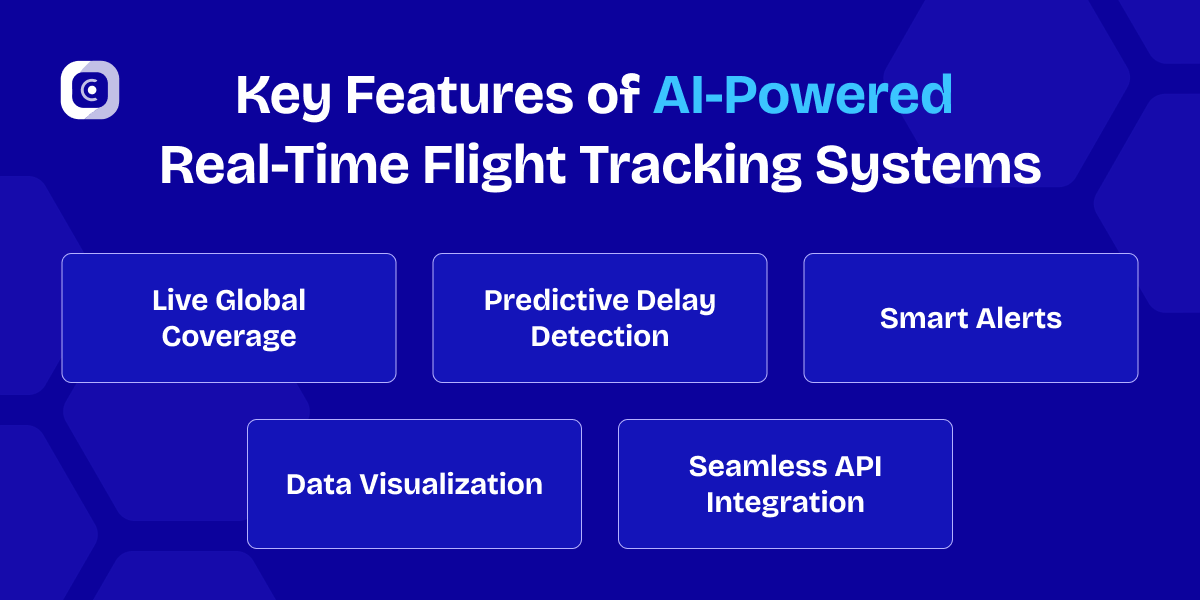
- Live Global Coverage: AI algorithms are capable of providing real-time updates on flights around the world by tracking satellites and multiple sensors.
- Predictive Delay Detection: Weather, congestion, and technical difficulties cause disruptions, and AI flight tracking systems can predict which flights will encounter problems.
- Smart Alerts: Integrated AI flight delay alerts keep customers updated through email, SMS, or in-app messages.
- Data Visualization: Dashboards assess KPIs regarding performance, and provide insights on the state of the flight, likelihood of delays, and overall flight performance.
- Seamless API Integration: Airlines can connect their booking, check-in, and customer relationship management tools to AI tracking systems using flight booking API integration.
With these features, airlines no longer just react but they anticipate.
Predictive Flight Delays Using AI: The Power of Anticipation
One of the most expensive problems in the field of aviation is the issue of delays. Weather problems, air traffic, and mechanical situations may affect global schedules. But predictive flight delays using AI have changed the situation.
AI technologies for anticipating delays in flights have changed the situation. For example, AI systems trigger automatic alerts for possible route optimization when they identify certain hours in which a route regularly encounters turbulence.
Combining AI in travel automation with live tracking allows airlines to:
- Anticipate and mitigate delays prior to departure.
- Provide proactive notifications to passengers through integrated systems.
- Adjust flight schedules based on real-time variables.
For instance, major airlines employ predictive technology to assess and automatically manage alternative flight paths in anticipation of severe weather. This functionality integrates seamlessly with B2B travel portals and mobile applications to maintain a unified user experience across services.
The advantages are clear: fewer flight cancellations, improved punctuality, and increased customer satisfaction. In AI aviation ecosystems, this capability creates a competitive advantage.
Key Benefits of AI in Real-Time Flight Tracking

For Airlines
AI moves flight management from reactive to proactive operations. Here’s how:
- Operational Efficiency: AI reduces manual oversight, thereby increasing precision in reporting flight data and in managing crews.
- Cost Savings: Predictive analytics reduces costs by avoiding resource waste and delaying costs associated with unplanned delays and fuel inefficiency.
- Real-Time Collaboration: Ground staff, ATC, and maintenance, as well as other departments, have access to synchronized and unified views of flight data.
- Improved Safety: AI assesses and identifies risks associated with abnormal engine performance and altitude.
Intelligent software like travel booking systems allows airlines to integrate and coordinate multiple disparate operational modules, from reservation systems all the way to post flight data analysis.
For Travelers
Travelers also benefit from AI-powered live tracking.
- Instant Travel Updates: Travelers receive notifications about any delays, gate changes, or even cancellations.
- Predictive Insights: AI predicts the risk of missing a connecting flight and offers alternative travel plans.
- Personalized Experience: Alerts are personalized based on the passenger’s itinerary and travel preferences.
- Trust and Transparency: Real-time flight tracking allows for travelers to trust the details given to them.
AI has changed the way customers in the aviation sector interact. Instead of worrying, customers can now feel assured there will be real, accurate updates.
AI-Powered Airline Alert Systems: The New Standard of Passenger Communication
Communication gaps between internal updates and public notifications are common in traditional airline communication systems. AI-powered airline alert systems, however, have resolved this issue completely.
The systems analyze operational data in real time and instantly communicate any changes such as delays and gate changes included through all appropriate channels, as dictated by AI.
Benefits for Airlines
- Proactive Communication: Passenger notifications are automatic rather than relying on manual updates.
- Reduced Workload: Customer service calls about flight status updates are drastically reduced.
- Consistency Across Channels: Alerts remain synchronized across various platforms– email, SMS, app, and portal.
When combined with real-time flight tracking, these systems become predictive, reduce confusion, and enhance the integrated customer experience.
This is especially useful with AI-based ecosystems such as Agentic AI in Travel, where automation takes care of complex, multi-step decisions and the necessary communications.
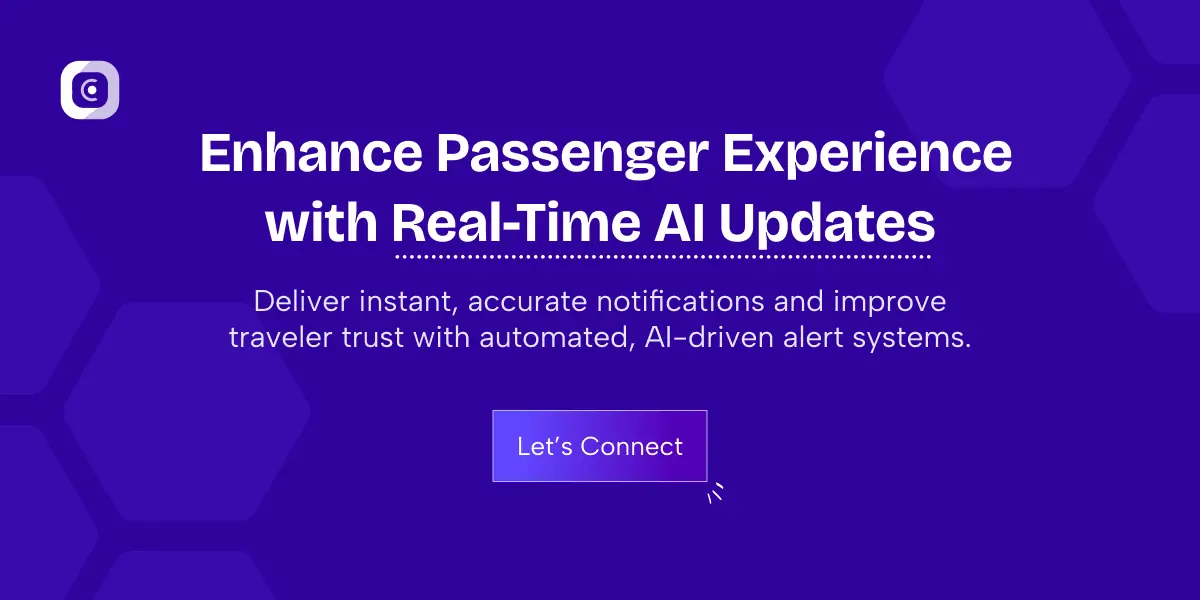
Real-World Use Cases of AI in Flight Tracking and Delay Management
AI has begun transforming aviation industry operations. Below are some practical applications that demonstrate this value:
1. Predictive Maintenance
Using AI, airlines assess aircraft sensor data to anticipate potential component failures, thereby reducing downtime and preventing cancellations.
2. Route Optimization
By analyzing live airspace congestion and weather conditions, AI determines the most efficient routes, saving time and fuel.
3. Crew and Resource Scheduling
AI performs real time adjustments to crew schedules in the event of delays, maintaining legal compliance, and operational efficiency.
4. Dynamic Passenger Rebooking
AI facilitates integration with flight booking engines to automatically rebook passengers on delayed flights to minimize wait time.
5. Compliance and Reporting
AI facilitates the seamless preparation of data for reporting to aviation authorities such as the IATA, as well as for safeguarding transparency and safety protocols.
These use cases show that AI in aviation is no longer viewed as an additional component; it has become an essential basis for operational intelligence.
6. Managing system outages and disruption events
Recently, a cyber-attack targeted check-in and boarding systems at major European airports like London Heathrow, Brussels, and Berlin, led to numerous delays, cancellations, all because of a third-party provider failure – as reported by Reuters. Airlines that use an AI flight tracking system that continuously monitors the status of every aircraft, tracks routes, and provides real-time travel updates, combined with AI-powered airline alert systems, would have been able to:
- Informs passengers right away when there’s a delay or a change of gate so they don’t have to wait in a long line.
- Predict future schedules that may be impacted by a system outage so you can adjust flights and crews in advance.
- Enable operations teams to have complete visibility through dashboards by integrating them into the flight booking systems for better coordination.
This real-life example illustrates the necessity for contemporary airlines to innovate beyond the conventional methods of tracking flights and to utilize AI technologies not only for tracking the movements of flights, but for tracking potential disruptive cases as well.
The Future of Real-Time Flight Tracking with AI
Continuing advancements will be focused in the areas of automation and prediction in real-time flight tracking, now AI will soon be integrated with next-generation technologies like IoT-enabled aircraft, blockchain-secured travel and hyper-personalized communication with passengers.
Key Advancements Ahead
- AI-Driven Route Correction: Automatic mid-flight reroute when an irregularity is detected.
- Real-time Collaborative Decision-Making (CDM): AI systems providing real-time data interchanges between carriers, Air Traffic Controllers (ATCs), and airports.
- Passenger-Oriented Disruption Predictions: Identifying possible operational interruptions using passenger travel plans.
- Autonomous AI Agents: Mistral like bots managing autonomous travel updates.
With the continued advancement of AI, real-time flight tracking will become the primary tool in aviation operation.
Conclusion: AI Is Redefining the Future of Flight Tracking
Real-time flight tracking has been revolutionized by AI, permitting the automation of various functions alongside predictive and proactive communications. From predictive flight delays using AI to AI-powered airline alert systems are advancements that guarantee travelers a smooth experience while airlines manage operations effectively. The forthcoming innovations are expected to incorporate hybrid intelligence wherein AI systems operate independently and in conjunction with humans. Early adoption of this strategy will position such airlines as forerunners in the alteration of travel in the coming decade.
For further insights on the impact of automation on aviation technology, read Future of Flight Booking Technology, or check our expertise in Travel solutions.
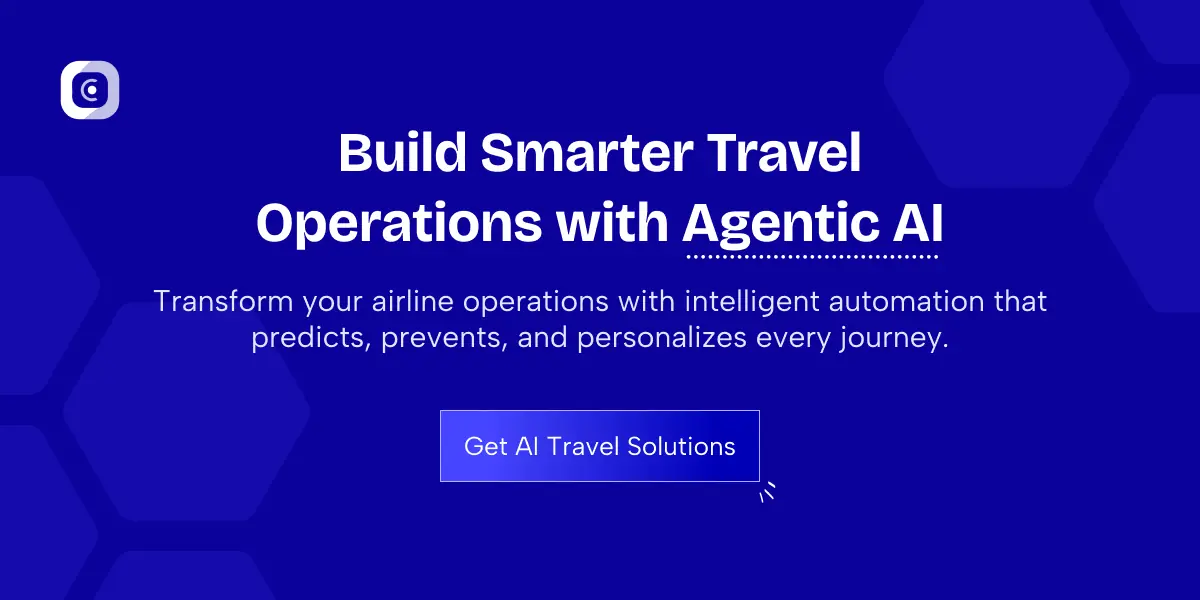
FAQs
What is real-time flight tracking?
It’s the continuous monitoring of aircraft movement using live data for accurate, up-to-the-minute flight information.
How does AI improve real-time flight tracking?
AI evaluates real-time flight status changes and predicts rapidly using data from multiple sensors and weather patterns.
What are predictive flight delays using AI?
They are forecasts powered by AI that identify possible delays by analyzing operational and environmental data in real-time.
What are AI-powered airline alert systems?
They notify passengers about changes and delays in their travel plans in real-time through various means of communication.
How is AI shaping the future of travel?
Through automation, precision, and predictive notifications, AI significantly enhances the safety, efficiency, and overall operation of air travel.


